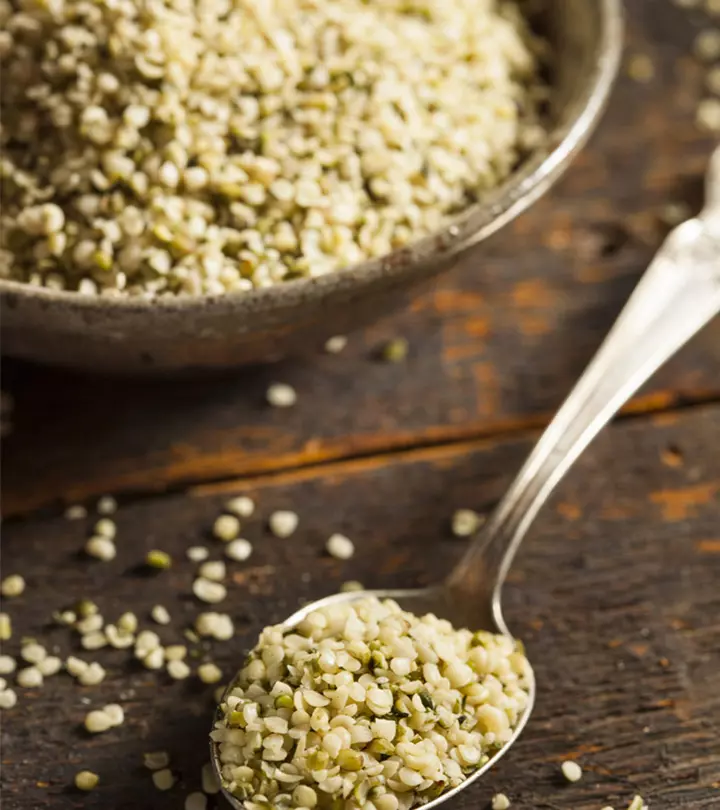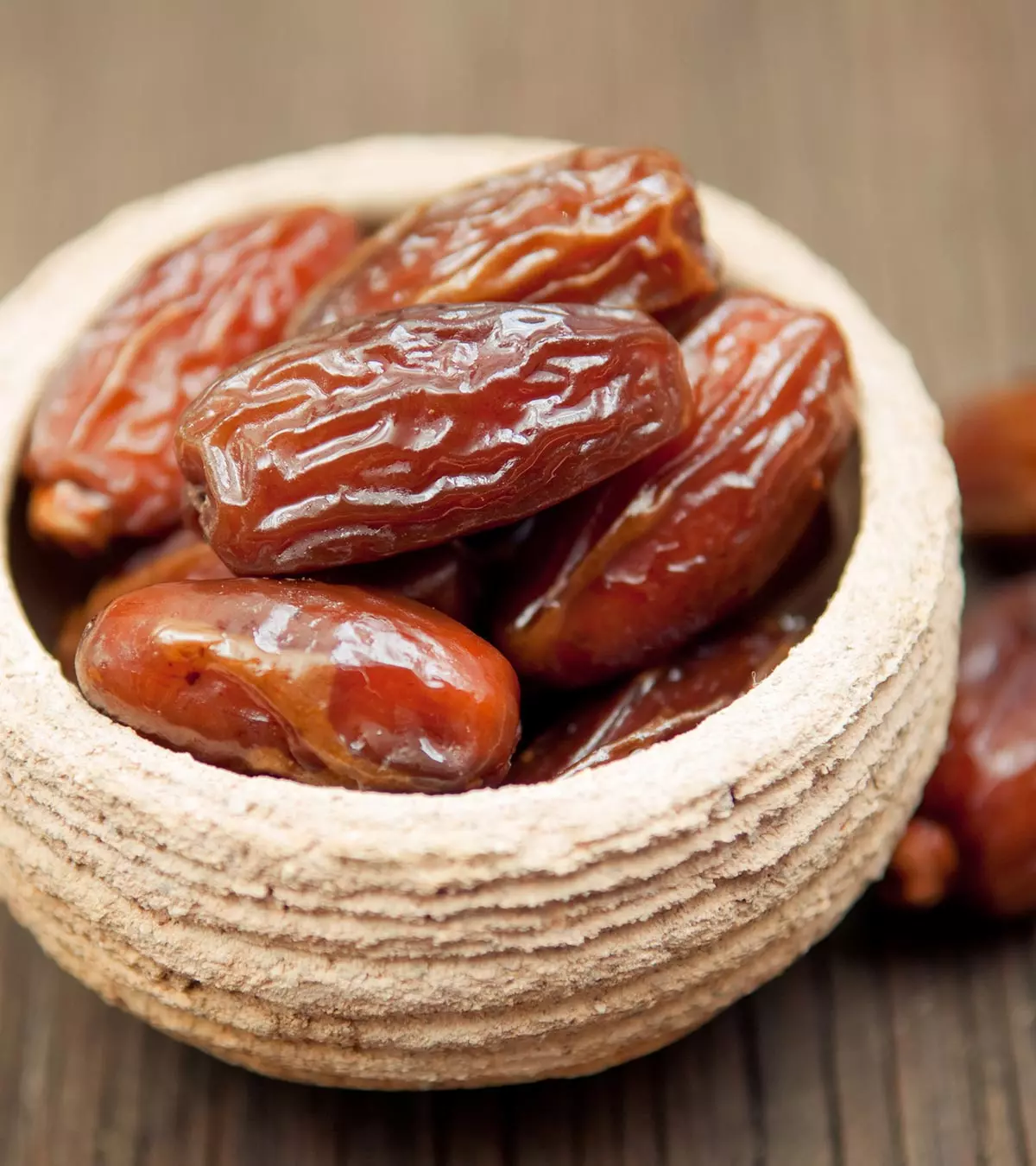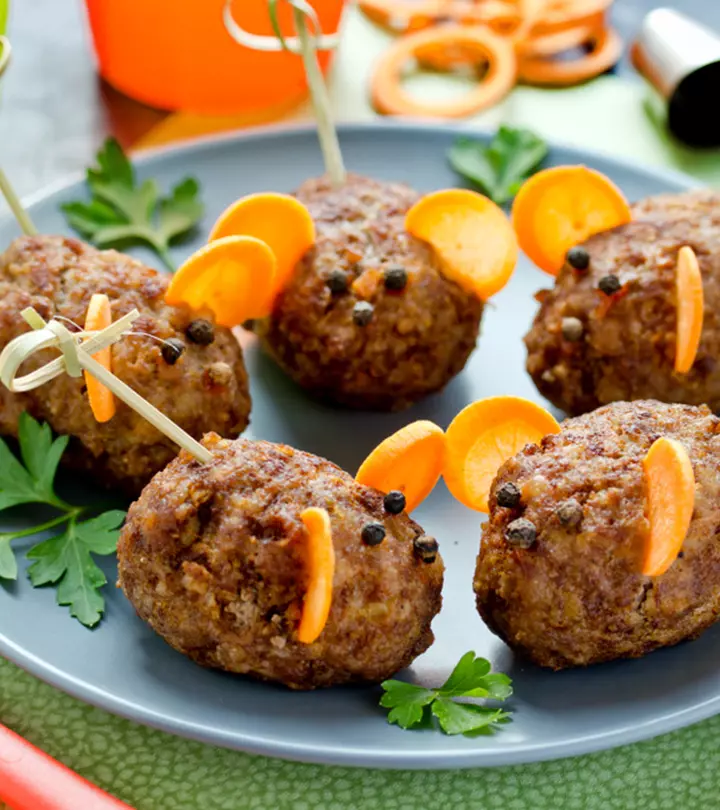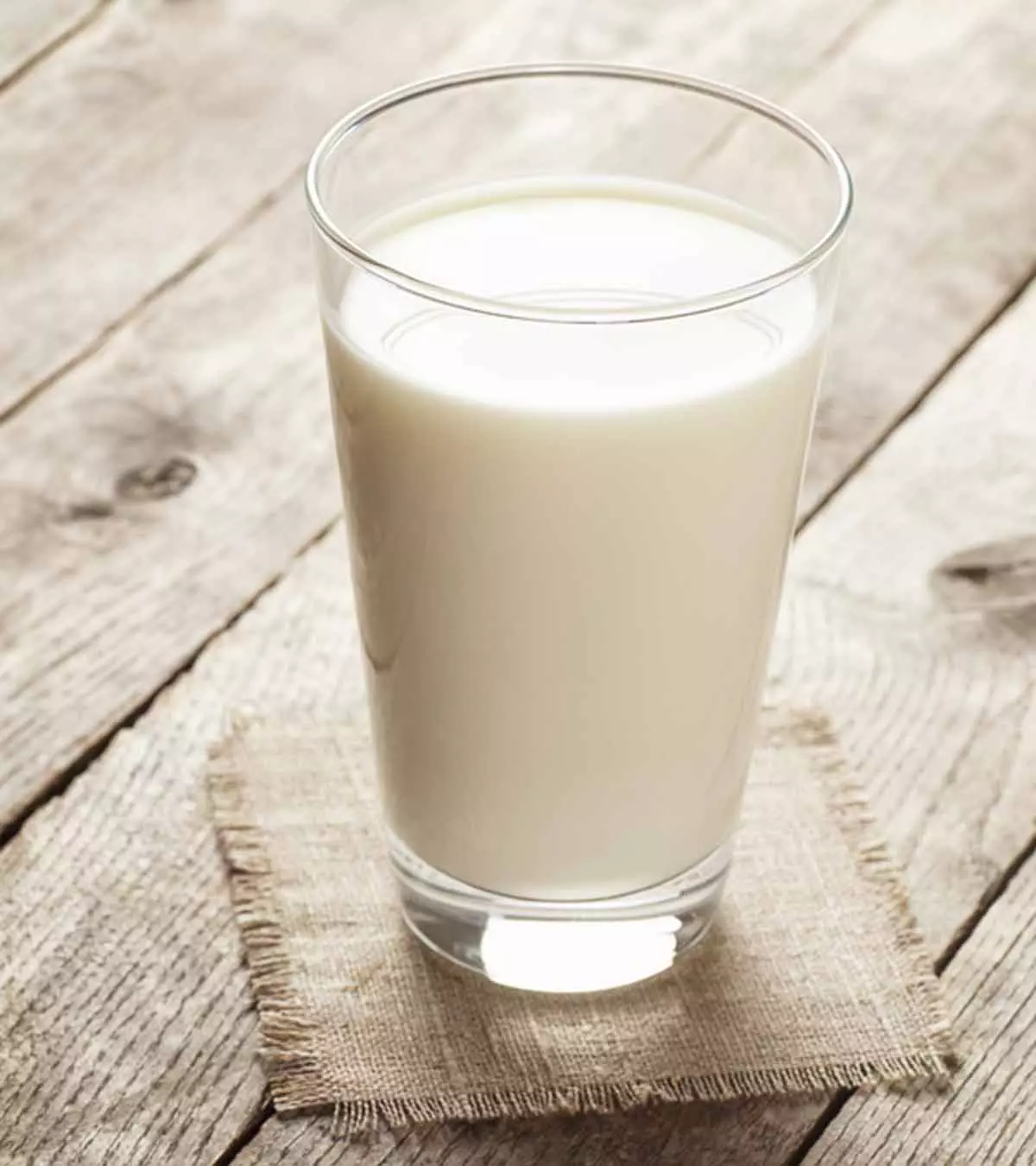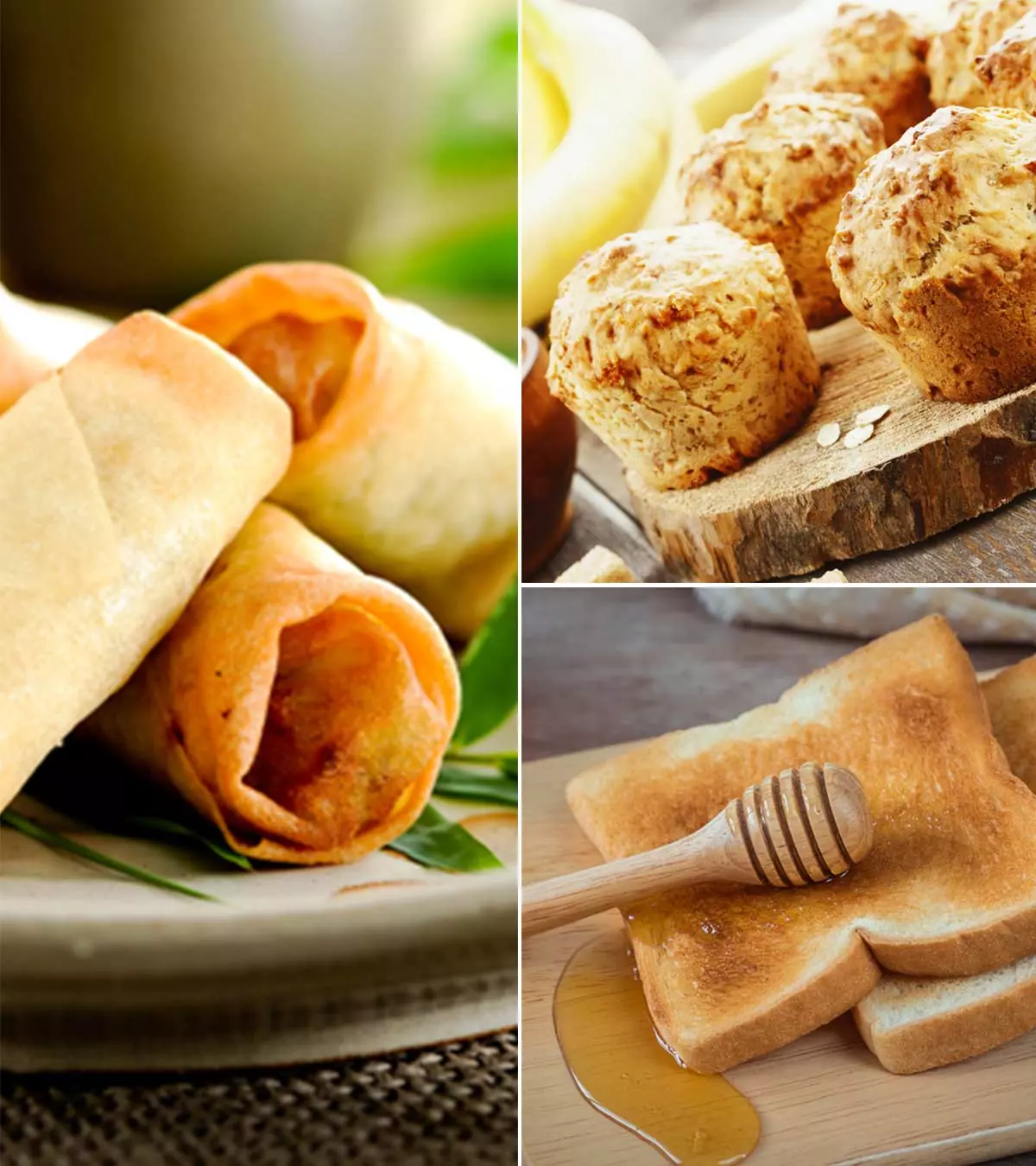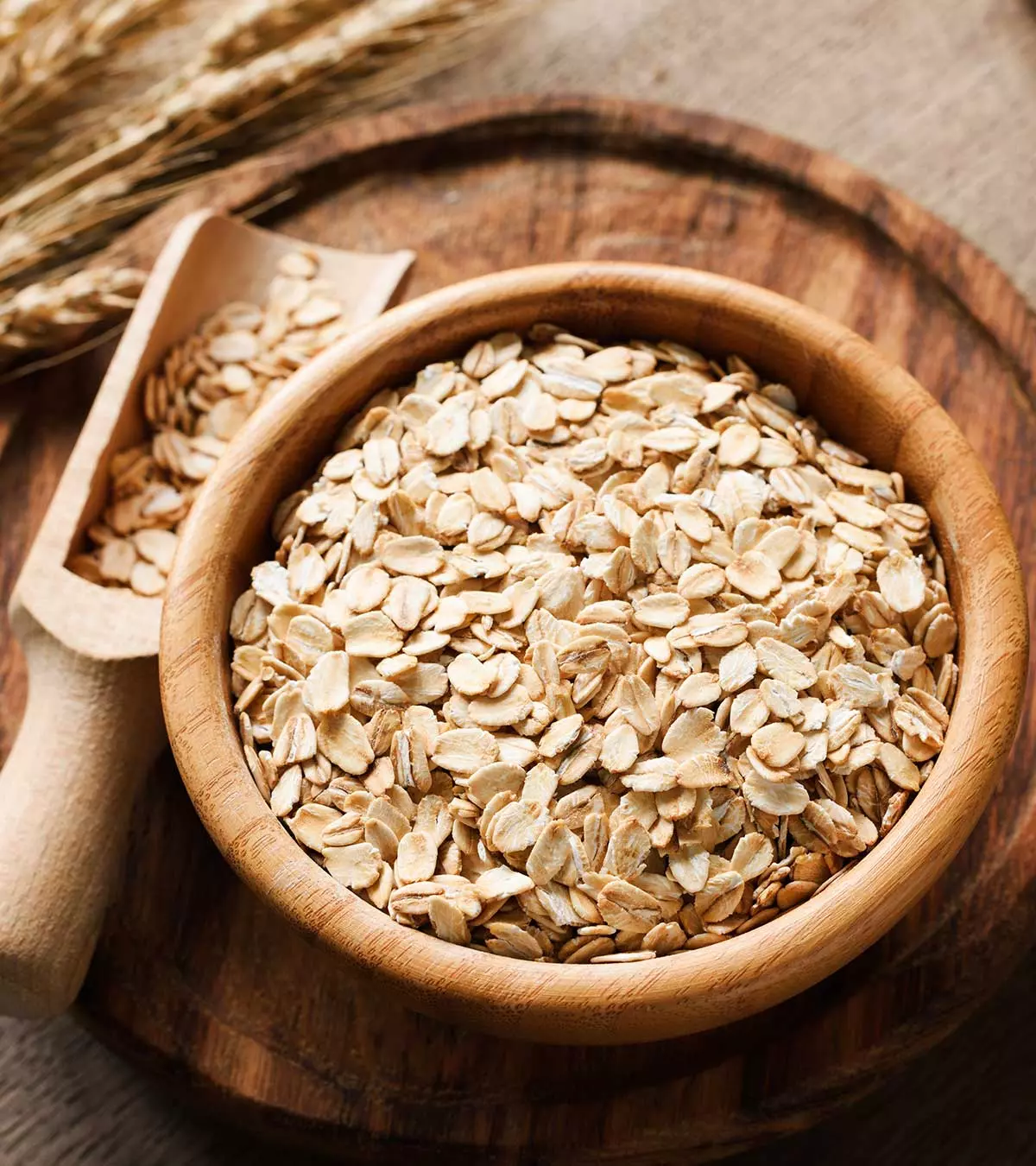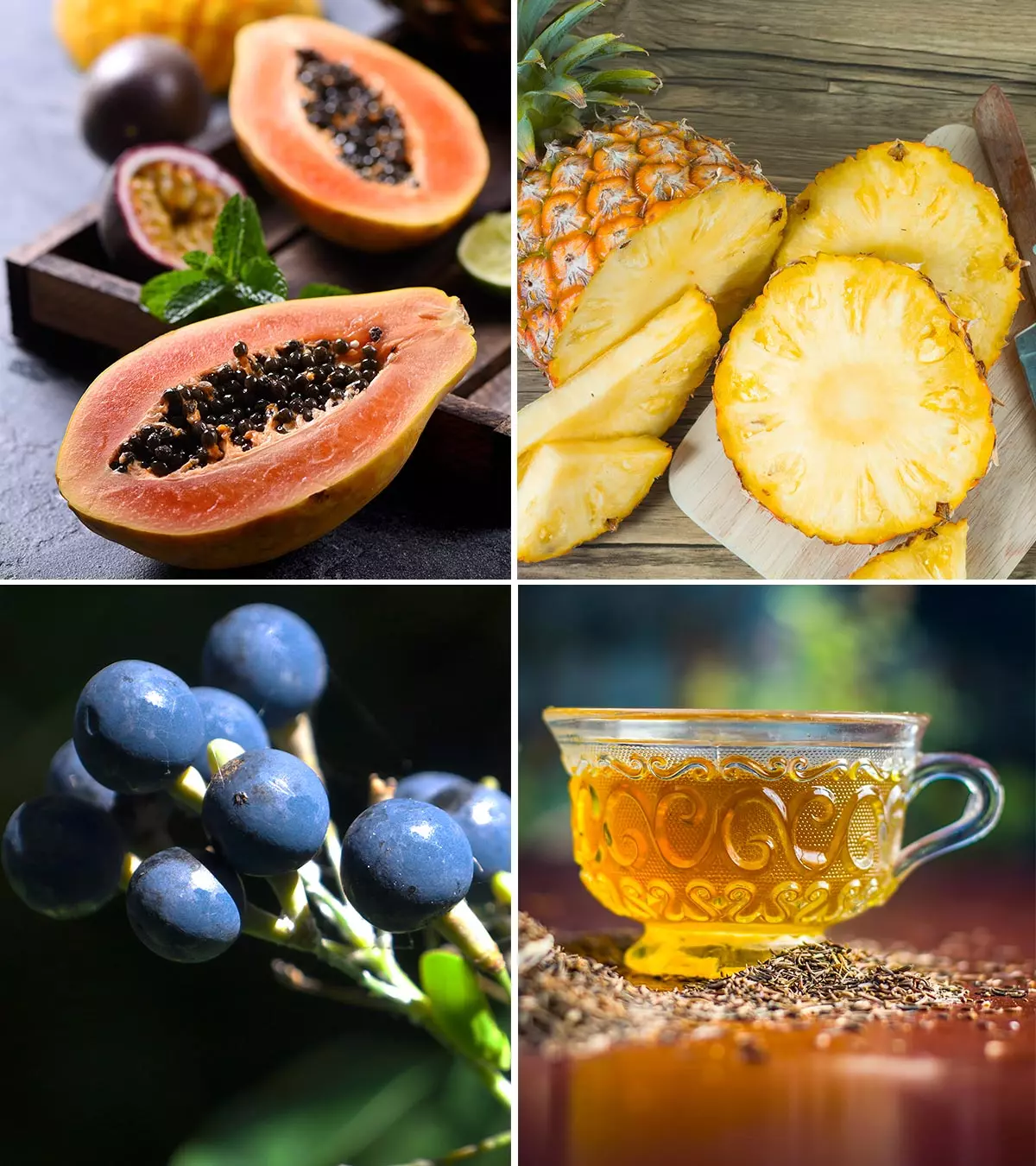
Image: ShutterStock
If you have been waiting for 40 weeks and are nearing the due date of your pregnancy, but still there are no signs of contractions or pain, your doctor may suggest inducing labor through alternative methods. They may suggest medications, exercises, or even foods to induce labor. Certain foods may assist you in going into labor if it does not occur naturally. However, the safety and efficacy of these techniques, particularly concerning maternity, are unknown. Therefore, before trying any alternative methods to induce labor, including dietary changes, consult your healthcare provider.

Read on to learn about all of the foods you can try that may help you naturally induce labor.
Key Pointers
- Certain foods are capable of inducing labor.
- Spicy and zesty food, pineapples, papaya, castor oil, balsamic vinegar, raspberry leaf tea, licorice root, cumin tea, and black and blue cohosh are known to cause contractions, thus inducing labor.
- Be aware that spicy and zesty foods might sometimes lead to preterm labor due to gastric distress.
- It is best to avoid greasy or heavy foods when trying to induce labor.
Ten Foods To Induce Labor
Several foods across cultures have been traditionally used in the weeks preceding delivery to ease the labor process. While some have been scientifically proven to be more effective, others receive strong support from regional legends.
Here are a few foods to induce labor:
- Spicy and zesty foods: Spicy dishes, be they Indian curries, or Mexican or Thai dishes, are believed to induce labor. When digested, spicy foods stimulate the prostaglandinsiGroup of lipids that control processes such as inflammation, blood flow, formation of blood clots, and induction of labor that are known to induce contractions of the uterine walls (1). Some studies suggest that an active component called capsaiciniChemical that reduces pain transmitters in nerves in peppers can create bowel movements and stimulate the womb.
- Pineapple: Pineapple contains bromelain, the active enzyme known for its ability to soften the cervixiNarrow canal in the lower end of the uterus that connects it to the vagina and thereby stimulate the contraction of the smooth muscles of the uterus to induce labor. Some studies indicate that daily consumption of 250g of pineapple between 40 and 41 weeks of gestation positively aids the process of cervical preparation, thus reducing the requirement for the use of oxytocin during labor induction (13). It is best to consume fresh pineapple and not the canned one to induce labor since canning and other processes tend to reduce the bromelain content of the fruit. Do not overeat the fruit as that can lead to diarrhea (1).
A mother and wife, Kayla Marie Slaney shares pregnancy experiences in her Vlogs. During her visit to the doctor, she comes to know that her baby has dropped in the birthing position and the labor can start any time. She tries natural ways to induce labor, one of which is eating pineapples. She says, “I have heard and read that bromelain, an enzyme in pineapples, helps soften the cervix and induce labor.” She clubbed eating pineapples with many other practices such as eating spicy foods, performing squats, and guided meditation. She believes these things worked for her as she delivered four days later (i).”
- Papaya: Unripe papaya contains an enzyme called papain, which can trigger contractions in the uterus. Papain is considerably found in the latex of unripe leaves and fruit. Studies indicate that this latex acts like oxytociniHormone that has varied functions, including facilitating childbirth and prostaglandins that can stimulate contractions (2). However, oral consumption of papain in the form of raw papaya may damage the esophagus. It has also been linked to the risk of poisoning and congenital disabilities in the fetus (14). Latex is lost in ripe papaya and therefore eating a ripe fruit will show no effect in inducing labor.
- Castor oil: Many professionals in midwifery and medicine believe that castor oil is effective in inducing labor. However, do not use this oil to induce labor before your due date. Though it is safe, it can make you feel nauseous and lead to diarrhea (3).
 Did you know?
Did you know?- Balsamic vinegar: The Italian ingredient is not only a delicious addition to your salad, but it also has labor augmentation properties (4). Made of white grape juice, it works to stimulate labor and is preferred to castor oil for its better taste (5).
- Raspberry leaf tea: While we don’t know how exactly red raspberry leaf tea works to induce labor, a study has found that the consumption of this tea could decrease the chances of your pregnancy extending beyond your due date. It is believed that this tea helps stimulate contractions and tones the muscles of the uterus. Though it is considered safe for the mother and the baby, more research is required to confirm its effectiveness (6).
Florida-based physician Dr. Matthew Casavant opines, “Red raspberry leaf tea is believed to tone the uterus and support labor, though it is more supportive than initiating labor itself. Always discuss any labor-inducing methods, especially natural ones, with an obstetrician to ensure safety for both mother and baby.”
- Licorice root: Black licorice is used to curb heartburn and many other gastric conditions. Licorice is also known to contain glycyrrhiziniCompound that gives sweet flavor to licorice , which tends to increase prostaglandins involved in uterine contraction. However, studies indicate that its consumption in large amounts is associated with preterm birth (7).
- Cumin tea: Cumin tea, usually known for treating bloating and other digestive issues, is also helpful in inducing labor (8). Just a tablespoon of cumin in boiling water can stimulate uterine contractions.
- Black and blue cohosh: These two herbs work on inducing labor when used after 40 weeks of gestation. According to reports from midwives, they work effectively when you have irregular or weak contractions. They work by bringing on labor and delivery in a natural way (9).
 Caution
Caution- Date fruits: Consuming date fruits towards the end of pregnancy may aid labor induction and uterine stimulation. Dates are known for boosting prostaglandin production and influencing prostaglandin receptors, which stimulate uterine contractions during labor. They may also be effective in cervical ripening. Studies indicate a reduced need for induction and a higher incidence of spontaneous labor in pregnant women who consumed six date fruits per day in the last four weeks before labor (15). Moreover, Date fruits are high in sugars that may provide ample calories and energy during labor. They also have anti-inflammatory and antioxidant properties and are rich in calcium, serotonin, and tannin, which can play a role in the contraction of the uterine muscles (10).
Remember, none of the above food recommendations are from a specialized doctor. The effectiveness of all these methods is not backed by research either. Some may work for you and some may not as they did for the others. So, we advise you to talk to a specialist in obstetrics or your prenatal care provider before you try any of them.
If you do not want to take the icky tasting castor oil or that bitter licorice, you may try some yummy foods.
Micki V, a mother and blogger, shares a smoothie recipe she tried to help induce labor. The blend includes pitted dates, fresh pineapple, unsweetened coconut, vanilla almond milk, Greek yogurt, and cinnamon. She writes, “Approximately 18 hours after eating this smoothie, our little boy was born!!! I’ll share the labor story soon, but it happened very quickly. I can’t say for sure if it was the smoothie or some of the other tricks I tried that encouraged his arrival–or maybe he was just ready. But we sure are glad he’s here! (ii)“
Labor Inducing Recipes To Try
Here are a few recipes with ingredients that may help induce labor or speed up the process. However, it is important to consult your gynecologist before trying these, especially if you have a high-risk pregnancy.
1. Eggplant Parmesan

You will need:
- 3 eggplants, medium-sized
- 1 cup flour
- 4 cups Italian seasoned breadcrumbs
- 6 eggs, beaten
- 8 cups marinara sauce
- Olive oil
- Half cup grated Parmesan cheese
- Half cup grated Romano cheese
- 2 cups Ricotta cheese
- ½ lb mozzarella cheese, shredded
How to do:
- Cut the eggplants into slices and put them on a paper towel to remove any extra moisture.
- Add salt and keep them aside. Preheat the oven to 375oF.
- Dip the slices in flour and then in breadcrumbs. Sauté them in oil until both sides turn golden brown.
- Place them in a baking pan and top them with the sauce, followed by layers of Parmesan, Romano, and Ricotta cheeses.
- Finally, top with mozzarella cheese and bake until it turns golden brown.
2. Red bean soup
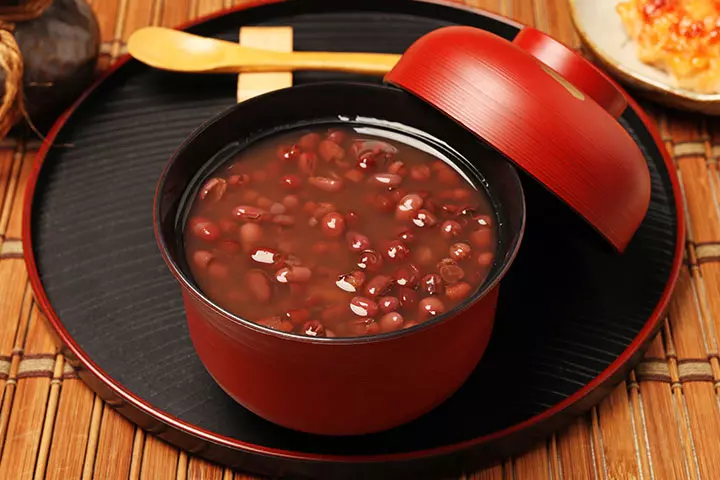
You will need:
- ¾ cup red beans
- ½ cup sugar
- 1.25l water
- Little soda (optional)
- Little salt (optional)
How to do:
- Soak red beans in a large bowl of water overnight.
- Remove the water the following day, and you can see the beans almost double their size.
- Put them in a slow cooker, select auto, and cook for four to five hours. They will turn squishy.
- Add sugar according to your preference and consume.
3. Labor-inducing cookie

You will need:
- 2½ cups all-purpose flour
- 1½tsp baking soda
- 1tsp ginger, finely ground
- ¾tsp cinnamon
- ½tsp cayenne pepper
- ½tsp salt
- ½tsp cloves, finely ground
- ½ cup granulated sugar
- 8tbsp unsalted butter
- 1/3 cup molasses (not the blackstrap)
- ¼ cup egg white
- 1 cup light brown sugar
How to do:
- Combine flour, baking soda, ginger, cayenne pepper and salt in a small bowl.
- Preheat the oven to 350°F.
- Blend unsalted butter with granulated brown sugar. Add molasses, followed by egg whites.
- Add dry ingredients to the above-blended mixture.
- Roll balls of ¾ inch, and coat them with sugar. Place them on cookie trays and bake them for eight to ten minutes.
4. Labor-inducing salad

You will need:
- Romaine lettuce
- Red cabbage
- Watercress
- Extra virgin olive oil
- Balsamic vinaigrette
- Gorgonzola cheese
How to do:
- Take equal parts of Romaine lettuce, red cabbage, and watercress. Rinse them properly and cut them into small pieces.
- Take the greens in a large bowl and add some Balsamic vinaigrette dressing.
- Add crumbled Gorgonzola cheese on it.
- For making Balsamic vinaigrette dressing – Combine one cup olive oil and 1/3 cup Balsamic vinaigrette and whisk gently to make the dressing.
5. Hot wings

You will need:
- One big 5 lb bag of frozen chicken wings
- ½ cup butter
- ¼ cup chili powder
- ¼ cup cumin
- 64 oz Tabasco sauce
- 1 tbsp white pepper
- 1 tbsp red pepper
How to do:
- Put all the ingredients except the chicken wings in a crockpot. Cook on low flame for two hours while stirring occasionally.
- Preheat the oven to 400°F.
- Cook chicken wings for about 30 minutes in the preheated oven. Once they get soft, cook again for 25 minutes.
- Transfer the wings to the crockpot containing hot sauce. Cook on low flame for one hour.
- Serve them hot.
Frequently Asked Questions
1. How long does it take to induce labor after eating spicy foods?
There is only anecdotal evidence that spicy foods induce labor. It has no scientific backing.
2. What are some hot foods that induce labor?
Curry sauces, Kimchi (Korean dish), Mexican sauces, jerk seasonings, Piri-Piri sauce, and mustard are some of the commonly used hot foods.
3. What foods should I avoid when trying to induce labor?
Greasy or heavy foods, excess caffeine, castor oil, wine, and excess chocolate should be avoided when trying to induce labor.
4. Can spicy food cause preterm labor?
Yes, spicy foods can sometimes lead to gastric distress, which could end in preterm labor.
5. Does garlic induce labor?
Dr. Laura Purdy, MD, MBA, a US-based board-certified family medicine physician, says, “Garlic may potentially assist in the induction of labor because it helps to stimulate contraction of the bowels, which is the same type of muscle as the uterus. They are smooth muscles that are not under conscious and voluntary control. So, as garlic stimulates the contraction of the bowels, it helps them empty, and sometimes this may initiate the early stages of labor in someone who is at the end of their pregnancy and preparing to go into labor naturally.”
6. Does evening primrose oil induce labor?
“Evening primrose oil may help induce labor. It has omega-3 fatty acids that can be a precursor to a substance called prostaglandins. Prostaglandins help soften the cervix, also called cervical ripening, and prepare the uterus to contract during labor. So, it is possible that evening primrose oil may assist in the induction of the labor,” adds Dr. Purdy
7. What natural methods besides food can help induce labor?
Besides consuming certain foods and herbs, other natural methods for inducing labor may include nipple stimulation, sexual intercourse, brisk walking, acupuncture or acupressure, and membrane stripping by a physician (12).
Spicy and tangy meals, pineapple, papaya, cumin tea, licorice root, and various other foods have been shown to cause uterine contractions in pregnant women, which can be used as an induction of labor method for natural childbirth. So, if you have already been 40 weeks pregnant and still haven’t had any signs of labor, you can try these foods to induce labor. However, before trying any food or other measures for inducing labor, you should consult your doctor or obstetrician to ensure mitigating any hazards to both the mother and the baby. If you’re unsure about any particular food, it is better to avoid it.
Infographic: Amazing Foods That Helps In Labor Induction
Once you complete your nine months of pregnancy, you can go into labor anytime soon. However, many women need some induction methods to bring on the labor. While there are various methods to induce labor, you may also try certain foods known to induce labor naturally. Check them out in the following infographic.
Some thing wrong with infographic shortcode. please verify shortcode syntax
Illustration: Foods To Induce Labor Naturally

Image: Dall·E/MomJunction Design Team
Learn how to use pineapple to help induce labor naturally! Discover the benefits of eating pineapple to help start labor and get tips on how to do it safely.
Personal Experience: Source
MomJunction articles include first-hand experiences to provide you with better insights through real-life narratives. Here are the sources of personal accounts referenced in this article.
i. How to induce labor – it worked! (delivered 4 days after).https://www.youtube.com/watch?v=aMOpWq70c9c ii. Labor Inducing Smoothie.
https://masonjarchampagne.blogspot.com/2013/02/labor-inducing-smoothie.html
References
- FACT OR FOLKLORE: 7 OLD WIVES’ TALES ON HOW TO INDUCE LABOR NATURALLY.
https://vitalrecord.tamu.edu/old-wives-tales-how-to-induce-labor-naturally/ - Meera Sumanth and Ugendra K; (2013); Effect of Unripe Carica Papaya on Uterus.
https://www.ijrap.net/admin/php/uploads/1012_pdf.pdf - Isabella Neri et al.; (2018); Castor oil for induction of labour: a retrospective study.
https://pubmed.ncbi.nlm.nih.gov/28618920/ - Balsamic Vinegar.
https://people.wou.edu/~jaadams/VINEGAR/balsamic.htm - Marit L. Bovbjerg et al.; (2014); What Started Your Labor? Responses From Mothers in the Third Pregnancy Infection and Nutrition Study.
https://www.ncbi.nlm.nih.gov/pmc/articles/PMC4210668/ - M Simpson et al.; (2001); Raspberry leaf in pregnancy: its safety and efficacy in labor.
https://pubmed.ncbi.nlm.nih.gov/11370690/ - Hesham R. Omar et al.; (2012); Licorice abuse: time to send a warning message.
https://www.ncbi.nlm.nih.gov/pmc/articles/PMC3498851/ - Does spicy food induce labor?
https://podcasts.ufhealth.org/does-spicy-food-induce-labor/ - Black Cohosh.
https://www.srs.fs.usda.gov/pubs/gtr/gtr_srs097.pdf - Alireza Bagherzadeh Karimi et al.; (2025); Effects of date fruit (Phoenix dactylifera L.) on labor and delivery outcomes: a systematic review and meta-analysis.
https://bmcpregnancychildbirth.biomedcentral.com/articles/10.1186/s12884-020-02915-x - The End is Near: Avoid Using Castor Oil to Induce Labor.
https://intermountainhealthcare.org/blogs/the-end-is-near-avoid-using-castor-oil-to-induce-labor - The truth about “natural” ways to induce labor.
https://utswmed.org/medblog/truth-natural-labor/ - Sedigheh Shariat Moghani et al.; (2025); Investigating the effect of edible pineapple on the ripening of the cervix and the onset of labor.
https://assets-eu.researchsquare.com/files/rs-2915312/v1/b5965b5c-ff6e-4e13-b12e-6ff6721819a9.pdf?c=1704865073 - Papaya.
https://medlineplus.gov/druginfo/natural/488.html - Kai I Cheang T. T. Nguyen and Kelsey E. S. Salley; Raspberry Leaf and Hypoglycemia in Gestational Diabetes Mellitus.
https://www.semanticscholar.org/paper/Raspberry-Leaf-and-Hypoglycemia-in-Gestational-Cheang-Nguyen/5a732fa9b56ff20e02eaced55dae58d51121924d - O Al-Kuran et al.; The effect of late pregnancy consumption of date fruit on labour and delivery.
https://pubmed.ncbi.nlm.nih.gov/21280989/
Community Experiences
Join the conversation and become a part of our nurturing community! Share your stories, experiences, and insights to connect with fellow parents.
Read full bio of Dr. Anita Gondy
- Dr. Matthew Casavant is the founding physician of South Lake OB/GYN & Advanced Surgery. He received his medical degree from Nova Southeastern University in South Florida and completed his residency as an Ob/Gyn at St. Vincent’s /Mercy Hospital in Toledo, OH. Dr. Casavant also holds a BS degree in Micro and Molecular Biology.
 Dr. Matthew Casavant is the founding physician of South Lake OB/GYN & Advanced Surgery. He received his medical degree from Nova Southeastern University in South Florida and completed his residency as an Ob/Gyn at St. Vincent’s /Mercy Hospital in Toledo, OH. Dr. Casavant also holds a BS degree in Micro and Molecular Biology.
Dr. Matthew Casavant is the founding physician of South Lake OB/GYN & Advanced Surgery. He received his medical degree from Nova Southeastern University in South Florida and completed his residency as an Ob/Gyn at St. Vincent’s /Mercy Hospital in Toledo, OH. Dr. Casavant also holds a BS degree in Micro and Molecular Biology.
Read full bio of Rebecca Malachi
Read full bio of Swati Patwal
Read full bio of Dr. Joyani Das







